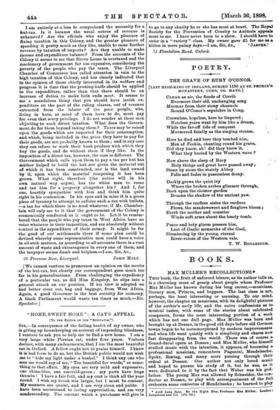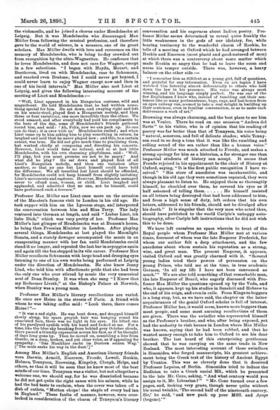BOOKS.
MAX MULLER'S RECOLLECTIONS.*
THIS book, the fruit of enforced leisure, as its author tells us,. is a charming mass of gossip about people whom Professor Max Muller has known during his long career,—musicians, literary men, Princes, and beggars. The last class is not, perhaps, the least interesting or amusing. To our mind, however, the chapter on musicians, with its delightful pictures of the author's early life, and the naive confessions as to musical tastes, with some of the stories about celebrated composers, forms the most interesting portion of a work which has not one dull page. Max Muller was born and brought up at Dessau, in the good old days before old German towns began to be metamorphosed by modern improvements and when life went quietly with a simplicity and charm now fast disappearing from the world. There was of course a Grand-ducal opera at Dessau ; and Max Muller, who himself studied music with the intention, it appears, of becoming a professional musician, remembers Paganini, Mendelssohn, Spohr, Sontag, and many more passing through their ordeal at Dessau. Our author not only loved MUSIC and hoped to pursue his study of it, but he was, as it were, dedicated to it by the fact that Weber was his god- father. The young Max was allowed by Schneider, the con- ductor at Dessau, to play with accompaniment of the fall orchestra some concertos of Mendelssohn ; he learned to play • Auld Lang Sync. By the 1Vglat Hon. Professor Max Milner. Loudon: Longmans and Co. [We, 6d.]
the violoncello, and he joined a chorus tinder Mendelssohn at Leipzig. But it was Mendelssohn who discouraged Max MiiIler from following the musical profession, and therefore gave to the world of science, in a measure, one of its great scholars. Max Muller dwells with love and reverence on the memory of Mendelssohn, who is being to-day crowded out
from recognition by the ultra-Wagnerites. He confesses that he loves Mendelssohn, and does not care for Wagner, except in a few selections. "I began with Haydn, Mozart, and Beethoven, lived on with Mendelssohn, rose to Schumann, and reached even Brahma; but I could never get beyond, I
could never learn to enjoy Wagner except now and then in one of his lucid intervals." Max Muller also met Liszt at Leipzig, and gives the following interesting account of the meeting of Liszt and Mendelssohn
"Well, Liszt appeared in his Hungarian costume, wild and magnificent. He told Mendelssohn that he had written some- thing special for him. He sat down, and swaying right and left on his music-stool, played first a Hungarian melody, and then three or four variations, one more incredible than the other. We stood amazed, and after everybody had paid his compliments to the hero of the day, some of Mendelssohn's friends gathered round him, and said : 'Ah, Felix, now we can pack up. No one can do that ; it is over with us.' Mendelssohn smiled ; and when Liszt came up to him asking him to play something in return, he laughed and said that he never played now ; and this, to a certain extent, was true. He did not give much time to practising then, but worked chiefly at composing and directing his concerts. However, Liszt would take no refusal, and so at last little Mendelssohn, with his own charming playfulness, said : 'Well, I'll play, but you must promise me not to be angry.' And what did he play ? He sat down and played first of all Liszt's Hungarian melody, and then one variation after another, so that no one but Liszt himself could have told the difference. We all trembled lest Liszt should be offended, for Mendelssohn could not keep himself from slightly imitating Liszt's movements and raptures. However, Mendelssohn managed never to offend man, woman, or child. Liszt laughed and applauded, and admitted that no one, not he himself, could have performed such a bravura."
Professor Max Muller saw Liszt once more on the occasion of the Maestro's famous visit to London in his old age. He took supper with him on the Lyceum stage, and interpreted the conversation between him and Miss Terry. The lady ventured into German at length, and said "Lieber Liszt, ich liebe Dich," which was very pretty of her. Professor Max Mailer's last glimpse of Mendelssohn was at Bunsen's house, he being then Prussian Minister in London. After playing several things, Mendelssohn at last played the Moonlight Sonata, and a stately dowager accompanied the music in an exasperating manner with her fan until Mendelssohn could stand it no longer, and repeated the last bar in arpeggios again and again till the fan stopped in its vile career. Professor Max Milner recollects Schumann with large head and drooping eyes listening to one of his own works being performed at Leipzig under the direction of Mendelssohn. He also knew Jenny Lind, who told him with affectionate pride that she had been the only one who ever stirred by music the very unmusical soul of Dean Stanley. It was when she sang "I Know that my Redeemer Liveth," at the Bishop's Palace at Norwich, when Stanley was a young man.
Professor Max Miiller's literary recollections are varied. He once saw Heine in the streets of Paris. A friend with
whom he was taking coffee said : "Look there, there comes Heine !"—
" It was a sad sight. He was bent down, and dragged himself slowly along, his spare greyish hair was hanging round his emaciated face, there was no light in his eyes. He lifted one of his paralysed eyelids with his hand and looked at me. For a time, like the blue sky breaking from behind grey October clouds, there passed a friendly expression across his face, as if he thought of days long gone by. Then he moved on, mumbling a line from Goethe, in a deep, broken, and yet clear voice, as if appealing for sympathy : 'Das Manithier sucht im Diistern semen Weg.' [` The mule seeks his way in the dusti "
Among Max Miiller's English and American literary friends were Darwin, Arnold, Emerson, Froude, Lowell. Ruskin, Holmes, Tennyson, Browning, Kingsley, Clough, Helps, and others, so that it will be seen that he knew most of the best minds of our time. Tennyson was a visitor, but not altogether a welcome one, we should say, for he was dissatisfied because he did not get quite the right sauce with his salmon, while he had the bad taste to exclaim, when the cover was taken off a dish of cutlets, "Mutton chops! the staple of every bad inn in England." These faults of manner, however, were over- looked in consideration of the charm of Tennyson's literary
conversation and his eagerness about Indian poetry. Pro- fessor Muller seems determined to reveal quite frankly the little weaknesses in the gods of our idolatry, for, while bearing testimony to the wonderful charm of Ruskin, he tells of a meeting at Oxford which he had arranged between Ruskin and Emerson (most placid and good-natured of men) at which there was a controversy about some matter which
made Ruskin so angry that he had to leave the room and nurse his temper outside. There was, however, a heavy balance on the other side :—
" I remember him as diffident as a young girl, full of questions, and grateful for any information. Even on art topics I have watched him listening almost deferentially to others who laid down the law in his presence. His voice was always most winning, and his language simply perfect. He was one of the few Englishmen I knew who, instead of tumbling out their sen- tences like so many portmanteaus, bags, rugs, and bat-boxes from an open railway van, seemed to take a real delight in building up their sentences, even in familiar conversation, so as to make each deliverance a work of art."
Browning was always charming, and the beet place to see him was at Venice. There he read on one occasion "Andrea del Sarto " to his visitor, who is of opinion that his reading of poetry was far better than that of Tennyson, his voice being "natural, sonorous, and full of delicate shades; while Tenny- son read in so deep a tone that it was like the rambling and rolling sound of the sea rather than like a human voice."
Professor MUller was much attached to Fronde, and makes a
strong apology for him as a historian, a far stronger one than impartial students of history can accept. It seems that Fronde rejoiced in his appointment to the chair of History at Oxford, saying, "It is the first public recognition I have re-
ceived." "His store of anecdotes was inexhaustible, and though in his old age they were sometimes repeated, they were always pleasant to listen to. He enjoyed them so thoroughly himself, he chuckled over them, he covered his eyes as if half ashamed of telling them He himself ,insisted on all letters being destroyed that had been addressed to him, and from a high sense of duty, left orders that his own letters, addressed to his friends, should not be divulged after his death." It is singular that the very man who acted thus, should have published to the world Carlyle's unhappy auto- biography, after Carlyle left instructions that he did not wish this to be done.
We have left ourselves no space wherein to treat of the Royal people whom Professor Max Muller met at various times, foremost of whom was the late Emperor Frederick, for whom our author felt a deep attachment, and the few anecdotes about whom sustain his reputation as a strong, wise, and great man. The present Emperor, it appears, visited Oxford and was greatly charmed with it. "Several young ladies tried their powers of persuasion on the young Prince, who told me at the time, in true academio
German, 'In all my life I have not been canvassed so much." We are also told something of that remarkable man, the late Emperor of Brazil, who eagerly discussed with Pro-
fessor Max Muller the questions opened up by the Veda, and who, it appears, kept up his studies in Sanskrit and Hebrew to
the end of his reign, and even in exile. From Kings to beggars is a long step, but, as we have said, the chapter on the latter acquaintances of the genial Oxford scholar is full of interest.. Professor Muller has, it would seem, known more beggars than most people, and some most amusing recollections of them
are given. There was the swindler who represented himself as the Professor's brother, and who, after being exposed, yet had the audacity to visit houses in London where Max Muller
was known, saying that be had been robbed, and that he wanted money enough to take him to Oxford to see his dear brother. The last heard of this enterprising gentleman showed that he was carrying on the same trade in New Zealand. The most interesting account of these swindlers is Simonides, who forged manuscripts, his greatest achieve- ment being the Greek text of the history of Ancient Egypt by ITranios. This was so cleverly done that it deceived Professor Lepsius, of Berlin. Simonides tried to induce the Bodleian to take a Greek uncial MS., which he presented to the late Mr. Coxe, asking, "And what century would you assign to it, Mr. Librarian?" "Mr. Coxe turned over a few pages, and, looking very grave, though never quite without his usual twinkle, 'The second half of the nineteenth century,
Sir,' he said, and now pack up your MSS. and Apage (begone).'"







































 Previous page
Previous page